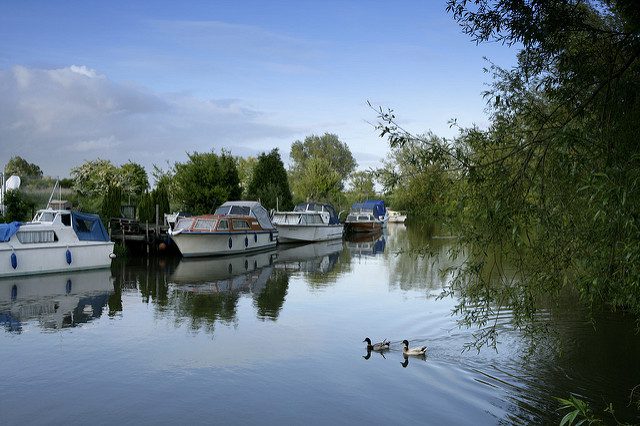World Rivers Day – Sunday 22nd September 2019

23rd September 2019
For World Rivers Day, an annual celebration of our world’s waterways, Kathi Bauer, Natural Capital Coordinator and PROWATER project manager at South East Rivers Trust, talks about the value of rivers to society and the impact we have on them …
Rivers are important parts of our landscape. Refreshing dips in the cool water on a hot summer’s day, the fascination of a dragonfly, or the silvery dart of a brown trout in the stream are memories that many of us have from childhood. But they’re not only beautiful places for recreation and inspiration, they are also necessary for our survival. Rivers and the groundwater bodies that are often connected to them provide our drinking water and irrigation for crops, and well-managed floodplains downstream protect many of us from flooding. Rivers are homes for rare species like water voles, nursery grounds for fish, they are also part of our transport system.
Next time you are out for a walk, see if you can work out how we benefit from some of these functions of our rivers – can you see any anglers or walkers allowing their dog a little dip? Any old water mills or cress beds? Signs of wildlife-rich floodplain meadows? Can you tell that it’s cooler closer to the water? Can you imagine what would happen if the river wasn’t there?
This is not only a rhetorical question, especially with regards to our unique chalk streams. Only about 200 of these features of chalk geology exist worldwide, and about 80% of these are found in Southern England. Their source can move depending on the level of groundwater, flowing over gravel beds and providing clean and clear, alkaline water that is home to water voles, lampreys, mayflies and other rare species. Their strange habitat of disappearing and leaving only a dry bed is even the stuff of local legends: the so-called “woe-waters” are said to appear every seven years and bring bad luck with them, due to an ancient fight between the pagan gods Thunar and Wodan and the Christian missionaries that came to Kent in the 6th century.
Although it is natural for so-called “winterbourne” sections of some chalk rivers to be dry for some periods, many of our chalk streams suffer from unnaturally low flows and over-abstraction of water, emphasised by a recent report on the crisis chalk streams are facing. They are also indicators of the state of our water resources overall – a healthy chalk stream can’t exist without a healthy aquifer. The urgency of addressing these issues was acknowledged in June when MPs even debated it in parliament. We use an average of up to 160 litres of water per person per day in the South East (depending on which specific area you are in) – more than the average person in the UK (141 litres/person/day), even though we have less water available per person than countries like Morocco! Most of this water is taken from the same aquifers that feed our chalk streams, and with a growing population and climate change, the amount available will decrease further. Not all of it is used for drinking water – hydropower, industry and agriculture also abstract.
A lot of responsibility for action to address these impacts and reduce water demand lies with the government, regulators and water companies – but it also lies with each of us. We are all connected to and benefit from our rivers. So here are some things you can do to help your rivers:
- Learn about how you can save water and implement those recommendations and check with your water company on any equipment they can provide.
- If you garden, try to reduce water use, for example by harvesting rainwater, choosing the right plants and watering strategy. Maybe you can even build a rain garden!
- Don’t pour things down the sink that don’t belong there, like oils, fats and greases – they block drains and can cause spills.
- Join a citizen science scheme like Riverfly or FreshWaterWatch to learn more about your environment and help collect valuable evidence on the health of our rivers.
- Ask your MP what she/he is doing to protect our rivers and water resources, and how she/he ensures water efficiency is maximised for businesses as well as households.
But first of all, make sure you get outside and have a close look! Have a wander along the Stour and dry valley, maybe take some pond-dipping equipment and peek under some stones to see if you can spot caddisfly cases and just enjoy the beauty of those special places.
The South East Rivers Trust is an environmental charity dedicated to the conservation and restoration of rivers in the south east of England. In Kent, for example, we work on climate change resilience through our EU Interreg projects such as PROWATER (focusing on adapting to water scarcity) and FRAMES (natural flood management) with water companies, Environment Agency, County Council and Countryside Management Partnerships as well as many others.
Popular articles
Walking the Pilgrims Way
Experience the beauty of walking across the Kent Downs NL through the…
Inspiring Pub Walks In Kent
With spring just around the corner, now is the ideal time to…
Walk Leader Volunteer Opportunity
Discover how you can become a walk leader in Medway! Uncover the…
